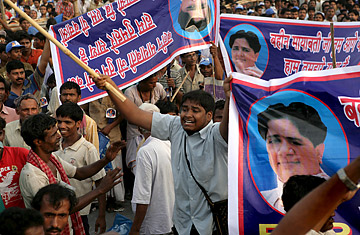
Bahujan Samaj Party (BSP) supporters take part in a campaign stop by party president and Uttar Pradesh state Chief Minister Mayawati Kumari in Eastern Indian city of Calcutta.
The world's largest electorate has spoken, although figuring out just what it said may still take a few days. India on Wednesday wrapped up its five-week election process, in which 428 million people cast their votes. But as impressive as the scale of of India's exercise in democracy may be, so is it notable for its almost complete lack of debate over real issues. The incumbent centrist Congress Party promises good governance, help for the poor and strong leadership. The main opposition Bharatiya Janata Party offers much of the same, albeit with a Hindu nationalist flavor that it tones up or down with the political winds. Neither party is expected to win an outright majority of seats in Parliament, so both have devoted most of the campaign period to wooing coalition partners from among the regional leaders expected to win king-making blocs of seats. As India awaits the results that will be announced on May 16, and the horse trading that has already begun, the following are the top five players to watch. (See pictures of India's Nehru dynasty.)
1. Mayawati: Untouchable Dalit
Mayawati Kumari, the lower-caste political rabble-rouser who is the chief minister of India's most populous state, Uttar Pradesh, has made no secret of her desire to be the country's first prime minister drawn from the Dalit community (also known as "untouchables"). "Nowadays, everyone wants to be prime minister," she told reporters in February. "Why can't a well-educated daughter of Dalits like me?" With so many lower-caste voters left out of India's economic boom, Mayawati's effort to translate her message of untouchable empowerment into electoral success seemed to have momentum. Instead, she appears to have drifted off center stage, becoming just one of many regional leaders with a parliamentary and voter power base to trade for a share of power. Building a national political organization takes time; look for Mayawati to angle for a key ministerial position this year, and hope to make a bigger impact in 2014.
2. Buddhadeb Bhattacharya: Relevance of the Reds
Buddhadeb Bhattacharya, a well respected career politician from West Bengal, is a Communist Party stalwart, but also a pragmatist. He appealed to the state's history as a once-mighty industrial center to woo automaker Tata Motors to build its revolutionary Nano there. That didn't turn out so well, and his state lost the prize to Gujarat. Now, Bhattacharya and the Left are fighting to stay relevant. After bolting the ruling coalition last year over the U.S.-India civilian nuclear deal, Bhattacharya is making overtures about rejoining a Congress-led government. The Left may be chastened, but it is still expected to hold the third-largest bloc of seats, and can't be ignored.
3. Narendra Modi: Heir Apparent
The chief minister of Gujarat, Narendra Modi is one of India's most popular and polarizing politicians. Modi has combined the popularity derived from his success as a technocratic leader of one of the country's most prosperous states, together with an uncompromising right-wing Hindu nationalist ideology, to make him the rising star of the BJP. The Party already controls 14 of Gujarat's 26 parliamentary seats, and if Modi succeeds in expanding that tally, he will cement his status as a future prime ministerial candidate. More important for this election, Modi is playing a central role in the BJP's negotiations with other parties. Any partners in a BJP-led coalition will have to be acceptable to Modi; and he to them.
4. Chandrababu Naidu: Hard Bargaining
Best known outside of India as the man who turned Hyderabad into a more efficient, better equipped version of the Indian technology hub of Bangalore, at home Chandrababu Naidu is regarded as a political street fighter. As the leader of a party founded by his father-in-law, the film star N. T. Rama Rao, Naidu outmanuevered his wife's stepmother for the post of chief minister of Andhra Pradesh, which he held from 1995 to 2004. His Telugu Desam Party has been part of the BJP's opposition coalition, but Naidu always keeps his options open. Still uncommitted, he could emerge as the kingmaker in this election, and is rare among Indian regional politicians in that he has enough global clout to present himself as a potential prime minister.
5. Jayalalitha: Riding Tamil Rage
She may look more matron than movie star, but Jayalalitha, a former Tamil film actress, is the ultimate diva of Indian politics. As the conflict in Sri Lanka escalated during the final weeks of the campaign, Jayalalitha, leader of one of two regional parties in the southern state of Tamil Nadu, has tapped into the anger of India's ethnic Tamils over the plight of their Sri Lankan kin. Her rivals also tried to play the ethnic card, but Jayalalitha has been much more strident, demanding that the Indian Army send in troops to create a separate Tamil state in Sri Lanka. To the extent that anger over Sri Lanka informs voter choices in the south, she stands to gain a big chunk of seats — and the ardent attention of any party hoping to form a government.
